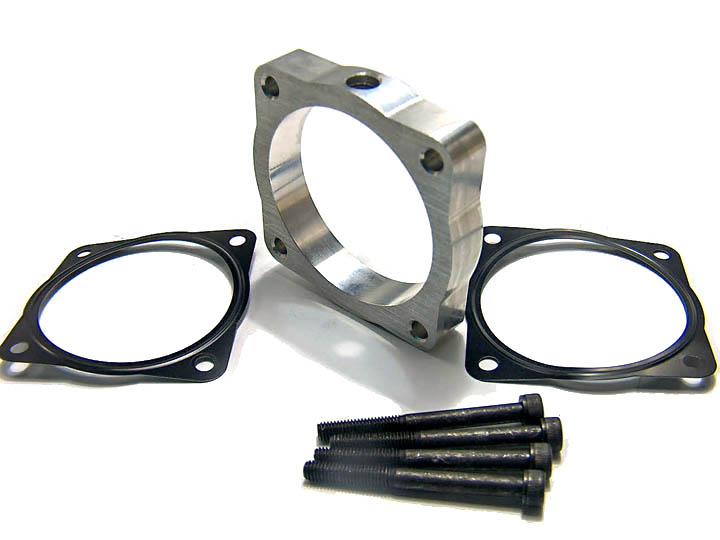Spray from air-cooling and octane nozzles at the same time with this drop-in package. For maximum intake air temperature (IAT) drop, position the higher-flow nozzle far away from the combustion chamber. (Just after a FMIC is coventionally best.) Place a smaller nozzle behind the TB in our custom-machined plate for detonation suppression. For more gains more of the time, opt for our more sophisticated Dual Nozzle System which allows for separate air-cooling and octane triggering (coming soon).

Kit includes Throttle Body Spacer Plate, gasket/s, extra-length bolts, 1x Solenoid Upgrade, fittings, and a Weld-on Nozzle Bung (for aluminum/steel pipe) or Sandwich Nozzle Bung (for rubber coupler/plastic pipe).
Tech:
There's only but so much humidity that a unit volume of air at a given starting temperature can possibly absorb in a given period of time. Placement of a single very large nozzle will oversaturated the intake air with humidity. Then it will "precipitate". In plain English, that means that it will literally rain inside the intake piping as the fluid falls out of suspension and coats the walls. When this occurs there is no cooling, no octane boost, and the owner may run the risk of damaging engine internals.
A dual nozzle strategy involves two smaller nozzles with a total flow capacity that matches or often exceeds what a single large one can do. The bigger of the two is wisely placed just after the intercooler and the smaller one just after the throttle. More distance traveled from the spray point to the combustion chamber ensures that the mist is carried by the air for a longer time period. More time allows for more complete evaporation. More evaporation guarantees more cooling.
The influence of time on evaporation is huge. Given a chance, the methanol will flash evaporate leaving behind pure water (which turns to gas much more slowly). However, the remaining droplets will now be ½ the original size but yet have 4.84 times the surface area. With this much more surface area exposed to the hot air, the water evaporates at a 4.84 faster pace! This makes it relatively dry by the time it reaches the throttle which it will NOT attack.
A throttle body-mounted nozzle works exactly the same way but in reverse. Less distance traveled = less evaporation = more droplets ready to turn to steam INSIDE the combustion chambers. This reduction in combustion temperature boosts the air/fuel charge's octane rating in a huge and very beneficial way. Of course, one may run a single medium-sized nozzle midway between the two ends. This delivers a compromised mix of both cooling and octane vs. maximum amounts of both. Special care must be taken to ensure that liquid droplets do not reach a drive by wire throttle body. (This is a non-issue for drive by cable throttles.)
SO, should you run one or two nozzles? You should run two IF your budget allows. If not, you will still be delighted with the performance of a single nozzle. Size that nozzle responsibly to achieve excellent results.
Nozzle sizing advice:
Flow rates MUST be dialed in to match total fuel requirement, boost levels, and intercooling setup. Please contact USRT for help with this critical aspect of kit configuration. Other companies randomly provide nozzles that they have in stock with the lazy and false assumption that "one size fits all" applications. They abandon the user to to determine final setup on their own via trial and error. Dyno time is expensive and so are engine internals. Consult with our tech support to get it right from the very beginning.


